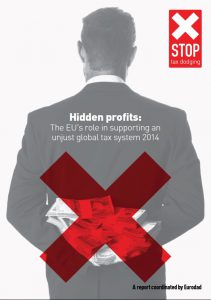Resource Title
Hidden Profits: The EU’s role in supporting an unjust global tax system 2014
Summary
The Hidden Profits report, published by 19 tax justice campaign groups across the EU, compares the performance of 15 EU governments on combating tax dodging and ensuring financial transparency globally.
The report finds that, as a group, the EU is failing to address global tax dodging and shows Ireland scoring poorly in key areas. This includes the Irish government’s failure to introduce a centralised public register of the real owners of companies and trusts, a key measure to combat financial secrecy on a global scale.
Resource Details
Description
19 civil society organisations across Europe have examined their national governments’ commitments and actions towards combatting tax dodging, ensuring transparency and their attitude towards letting the poorest countries get a seat at the table when global tax standards are negotiated.
For the first time, in this report, each country is directly compared with its fellow EU member states on four critical issues:
1. the fairness of their tax treaties with developing countries;
2. their willingness to put an end to anonymous shell companies and trusts;
3. their support for increasing the transparency of economic activities and tax payments of transnational companies
4. their attitude towards letting the poorest countries get a seat at the table when global tax standards are negotiated.
This report doesn’t only cover national policies, but also governments’ positions on existing and upcoming EU level laws and global reform proposals.
This report includes:
- an education-friendly country by country breakdown of three aspects: i) tax policies ii) financial and corporate transparency iii) global solutions presented in tables
- strong methodology explanations in the appendices and statistics
- recommendations to EU member states (per country) and institutions
As well as failing to set up a public register of the beneficial owners of companies and trusts, Hidden Profits shows that Ireland has not moved forward with requiring country-by-country financial reporting for multinational corporations.
To date, it seems that Ireland will move on these two issues only when it must move collectively. Ireland also scores poorly in promoting the interests of developing countries in tax treaties. Finally, Ireland scores especially badly on supporting the inclusion of developing countries in decision making on international tax policy, a process currently led by the OECD which excludes developing countries, although they are of course impacted upon by international tax rules.
A direct comparison of the 15 countries finds that:
- France is currently the strongest country on issues of transparency and reporting rules for transnational corporations and has actively championed the issue. However, recent developments seem to indicate the government may be back-tracking. Its vast range of tax treaties have caused substantial lowering of developing country tax rates, meaning vital revenues are being lost.
- Germany, Luxembourg, the Netherlands, Spain and Sweden are all bad performers on transparency, either in relation to the lack of information they give about company ownership at the national level or because they are resisting EU-wide initiatives to promote transparency on company ownership. This secrecy is helping companies to dodge taxes and shift profits.
- Spain has managed to negotiate the largest reductions in tax rates through its tax treaties with developing countries, which are then losing out on tax revenues.
Contents list:
- Glossary
- The global perspective
- Report findings
- Recommendations to EU member states and institutions
- Country findings
- Belgium
- Czech Republic
- Denmark
- France
- Germany
- Hungary
- Ireland
- Italy
- Luxembourg
- Netherlands
- Poland
- Slovenia
- Spain
- Sweden
- United Kingdom
This report was coordinated by Eurodad with contributions from civil society organisations in 15 countries across Europe including:
A special acknowledgement goes to Doctoral Researcher Martin Hearson of the London School of Economics and Political Science (LSE) for providing data and valuable input on the sections related to tax treaties.
Each country chapter was written by – and is the responsibility of – the nationally-based partners in the project, and does not reflect the views of the rest of the project partners.
Note: This report – the second in a series of three annual reports – brings together civil society organisations (CSOs) in 15 countries across the EU.
Available from:
Download Hidden Profits PDF (6.9 MB)
Download executive summary of Hidden Profits report PDF (2.2 MB)
Download the Ireland country profile from Hidden Profits PDF (12 pages, 1.6 MB)
For more visit the Debt and Development Coalition press release and the DDCI website https://www.debtireland.org

